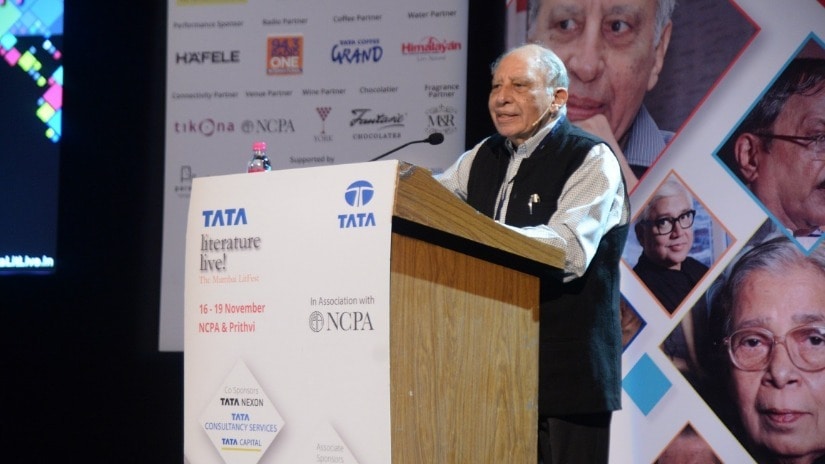Reading the works of former Indian Police Service officer and poet Keki Daruwalla is a delightful experience in itself, but watching him enunciate and recite each line with feeling is something else altogether. At a session of the eighth edition of the Tata Literature Live! The Mumbai LitFest, Daruwalla was in conversation with fellow poet and art curator Ranjit Hoskote. The author spoke about life in pe-Partition rural India, growing up with many languages, and his views on censorship. Apart from the stories that Daruwalla narrated, he also recited moving poems such as The Chinar, Greek Vases and Migrations, as well as more humourous ones like Self Poem, which left the audience spell-bound. It is not conventional for Parsis in Mumbai to learn languages such as Urdu, but Keki Daruwalla grew up in Lahore, where the spoken word and the very ambience was Urdu. Apart from translating Faiz, learning this language also led him to pick up certain words and weave them into his own writing. “I used the word guzishta because of its lovely sound,” he explained. [caption id=“attachment_4216767” align=“alignnone” width=“825”]  Keki Daruwalla at the Tata Literature Live Mumbai LitFest 2017[/caption] He spoke about the theme of travel which finds a large place in his body of work, adding that he sees himself and other poets as travellers. “We travel because we often fiddle for a line or metaphor which help the poem to go across to readers. Otherwise your poem is just a vast landscape,” he explained. He said that movement, such as the motion of travelling by a car, also has a connection with his writing. “If you’re not travelling, you’re just sitting in a chair and writing like anyone else. Imagination travels; I write about what I experience, and whilst sitting in a cubicle, you can’t experience much,” he said. Daruwalla talked about the beginning of his literary career, right from the days when he used to travel to Lucknow with family and make it a point to visit Ram Advani’s bookstore to buy works by Louis McNeice and other authors. He had already begun writing whilst being in the IPS when P Lal asked him if three of his poems could be published in an anthology, and also expressed the desire to publish a book of his poetry. Research plays a large part in Daruwalla’s creative process, and especially his prose writing. But even for several of his poems, he has referred to books that taught him about the subject matter, whether it was a guide by a civic surgeon for a poem on epilepsy or the history of Vasco da Gama and trade to write For Pepper and Christ. “You slog if you want to be a decent writer,” he opines. People have often chided the poet for his narrative style, asking him if his works are short stories rather than poems. “We were brought up with 19th century poetry, and Browning and others of his time wrote narrative poetry. The education board couldn’t afford the copyright fees for poems by 20th century writers who were still alive,” he said, with a chuckle. Daruwalla spoke about how fiction is being presented as fact and how fact is often being used in fiction in today’s times, as well as the role that a poet must play in telling history. “We are a mythologised people, and it is time that the government de-mythologise its citizenry. Perceptions about about the truth are important, and writers must be careful, because we can hurt people with our writing. The state has to apply a balm on both the writer as well as the person who has been hurt. We need a change of laws, otherwise people will file defamation suits all the time,” he said. He also spoke about the atmosphere of intolerance that seems to have gripped the country, as is evident from the backlash that the cast and crew of Sanjay Leela Bhansali’s Padmavati have had to face. “In India, we don’t react as individuals — we react as groups, and this is dangerous. If you don’t like a book, don’t read it; if you don’t like a film, don’t watch it,” he advised. Daruwalla was asked about the moment when he realised that he was a poet. “I realised this when I was leaving university. It was a compensatory mechanism, because I never wanted to get into the police! When you’re the son of a professor and literature seeps into your bones, you want to become a writer. Rhyme becomes part of your blood,” he said. When asked if the two sides to his personality — the policeman and the writer — are compartmentalised, Daruwalla said that each person has several dimensions, and that they cannot be seen as separate from each other. “You remain the man that you are,” he said.
Noted poet Keki Daruwalla held forth on his craft at the Tata Litlive on Day 2
Advertisement
End of Article


)



